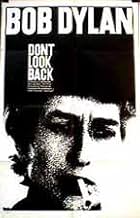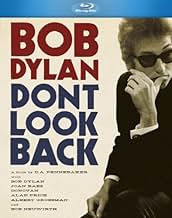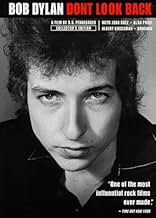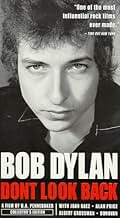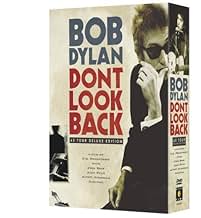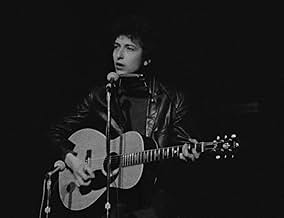Documentary covering Bob Dylan's 1965 tour of England, which includes appearances by Joan Baez and Donovan.Documentary covering Bob Dylan's 1965 tour of England, which includes appearances by Joan Baez and Donovan.Documentary covering Bob Dylan's 1965 tour of England, which includes appearances by Joan Baez and Donovan.
- Awards
- 4 wins total
- Self
- (uncredited)
- Self - science student
- (uncredited)
- Self
- (uncredited)
- Self
- (uncredited)
- Self
- (uncredited)
- Self
- (uncredited)
- Director
- Writer
- All cast & crew
- Production, box office & more at IMDbPro
Featured reviews
Check out the DVD if you have the opportunity
Fantastic
Iconic and unforgettable portrait
You can feel it. You let your whole being be absorbed by it. You're on a high. Then you catch your breath . . .
Bob Dylan, as depicted in Don't Look Back, is the kind of megastar that can grip you emotionally and intellectually. While their neighbours joined screaming mobs that bayed at the Beatles, Bob Dylan fans listen in rapt silence, taking in every word.
"How many times must the cannon balls fly - Before they're forever banned? The answer, my friend, is blowin' in the wind, The answer is blowin' in the wind."
He inhabits a hallowed quality. Anti-war protesters, educated and disenchanted youth, all see him as their hero. An emblem of hope. Dylan inspired people. Made them feel they could make a difference. Somehow make it a better world.
It was also the Swinging Sixties. Music videos hadn't been invented. In cinema, TV commercials director Richard Lester had kicked off a style of pop musical with the Beatles in A Hard Day's Night (1964). Andy Warhol projected live footage of a band to heighten a live performance (The Velvet Underground and Nico, 1966). Whereas for the opening scene of D.A. Pennebaker's film, Don't Look Back, a deadpan Dylan simply discards one large white card after another. They contain random words from the overlaid soundtrack song, Subterranean Homesick Blues.
That scene has been copied and parodied. Like the kiss-on-the-beach-at-the-edge-of-the-waves in From Here To Eternity, far more people know of and recognise the scene than have ever seen the film. Words are deliberately misspelt. Alan Ginsberg haunts the background as if he's wandered in from another film lot. The scene became one of the first 'music videos'. And the film became one of the early examples of fly-on-the-wall cinema.
Don't Look Back is one of the important movies of the decade for its development of cinema verité, a documentary style with many offshoots but at that point made possible with the new lightweight cameras and sound recorders. These were less intrusive and meant that events could be recorded in a way less staged, the filmmakers having opportunity to follow subjects down corridors or seemingly eavesdrop on conversations.
Don't Look Back follows Bob Dylan through his most iconic phase, dark glasses and leather jacket, on his 1965 UK tour at the height of his fame. (He is about to dispense with a rustic folksy style and upset fans by embracing rock and roll and electric guitars.) It is the Bob Dylan so cryptically emulated by Cate Blanchett in I'm Not There. This is the legend. And the man who became a legend in his own lifetime, constantly reinventing his poetry. He would one day be awarded a special Pulitzer Prize for his "profound impact on popular music and American culture, marked by lyrical compositions of extraordinary poetic power." Not to mention an honorary degree from the prestigious St Andrews University in Scotland.
The follow-the-tour format is a little like In Bed With Madonna. But the immediacy of the film foreshadow movies like Control. Stark black and white photography and a personality that dominates the screen without even trying. Joan Baez (who was near the end of an affair with Dylan) is singing in a hotel room. Dylan looks up with rapt attention (and obvious admiration) for the shy young folk singer Donovan. And clips from his sell-out Albert Hall concert. Throughout and in sharp contrast to almost everyone else captured in all their bygone sixties primness Dylan still looks cool and self-assured in his own skin even by 21st century standards. Somehow his image hasn't aged.
There was something almost mystical about Dylan at the time. Press conferences in the film (that would also be re-staged later in I'm Not There) show journalists nonplussed by the youngsters response. News stories marvel at how thousands of well-behaved youngsters are packing concert halls in essence to listen to several hours of one man's poetry. His lyrics, ranging from poignant stories to stream-of-consciousness collections, were emotionally resonant with metaphors and phrases that could be appropriated to every person's private suffering, every cry of pain behind anti-establishment (and particularly anti-war) sentiments. Dylan never claimed to be any other than a poet and a guitarist. "I got nothing to say about these things I write I just write them . . . I don't write them for any reason. There's no message." His almost angry 1960s disclaimer in the film will still be uttered almost 40 years later at great length in his Chronicles biography. No-one wanted to believe he was only interested in writing poetry. But his openness and honesty in facing down critics is disarming.
For non-music fans and people not specifically interested in the period, the film has slightly less to offer. Poor definition on many hand-held shots gives a lack of visual elegance. The lack of any voice-over means the viewer has to work out many details themselves. And, while it is a remarkable and very vibrant portrait of an esteemed artists at one of the most famous and influential periods of his career, there are maybe too few songs for fans.
Dylan would go on to win Grammy, Golden Globe and Academy Awards and receive several Nobel Prize nominations for literature. The film stops long before he had achieved such mainstream critical acclaim. It never features him singing the credits song, Subterranean Homesick Blues, or the song from which the title is taken. Ironically, it looks back to a period he himself had abandoned by the time the film was released.
Don't Think Twice, Watch This
Dylan Backstage, Onstage and In Between
Shot in black and white, the film shows Dylan to be very mercurial. He is at times charming, communicative and seemingly open about his feelings. Other times--in fact most of the time--he is confrontational, condescending and self-contradictory. He is about 24 years old and these scenes remind me of discussions I had when I was that age with other college students. His arguments are circular, as if he enjoys arguing more than he enjoys communicating.
He embraces the poet's privilege of not explaining the meaning of his lyrics (which is fine). One gets the feeling that he is tired of dealing with the media and others who want to pick his brain. Why did he give them audience, then? On the other hand, he is generous with fans who have no questions for him, merely seeking his presence or a glimpse of the man.
While some of his songs do seem somewhat shallow, others are undeniably deep with meaning about issues that are very timely. Regardless, his songs often have a hypnotic effect, with their sing-song cadences. This film might raise more questions than it answers, but it is fun to watch. The presence of Joan Baez is a plus. Her voice was always special. We don't see much of her, but enough to see her react to teasing and to make silly faces in return.
Dylan's songs feel mostly declarative. They are assertions and observations. They usually don't extract the emotional responses of, say, Joni Mitchell, who invites listeners to her inner world. Dylan asks his listeners to regard the outside world with him.
Did you know
- TriviaThe scene where Donovan visits Dylan in his hotel was generally viewed as Dylan putting the young singer-songwriter in his place when he grabs the guitar and performs "It's All Over Now, Baby Blue." But a 2015 Criterion Collection remaster, with improved sound, revealed that Donovan actually requested Dylan play that song for him. That gave the entire scene a new meaning and revealed Dylan and Donovan as more friends than rivals.
- Quotes
Albert Grossman: They've started calling you an anarchist.
Bob Dylan: Who?
Albert Grossman: The papers. That's the word now.
Bob Dylan: Anarchist?
Albert Grossman: Right. Yeah.
Bob Dylan: The newspaper's say I'm an anarchist?
Albert Grossman: Two or three. Just because you don't offer any solutions.
Bob Dylan: You're kidding!
Albert Grossman: Of course.
Bob Dylan: Anarchist? Huh? Give me a cigarette. Give the anarchist a cigarette. Anarchist? A singer such as I.
- ConnectionsFeatured in Precious Images (1986)
- How long is Bob Dylan: Dont Look Back?Powered by Alexa
Details
Box office
- Gross worldwide
- $934
- Runtime
- 1h 36m(96 min)
- Color
- Sound mix
- Aspect ratio
- 1.37 : 1


